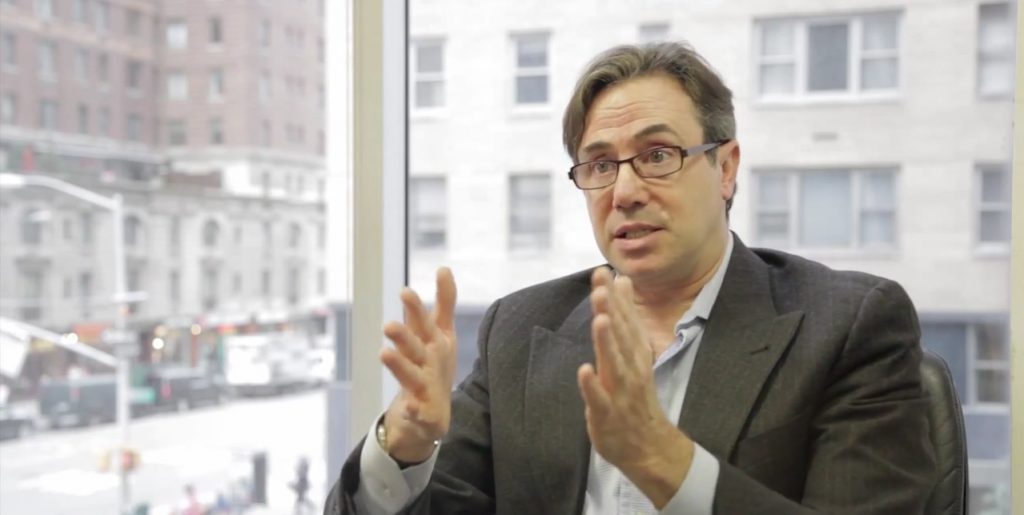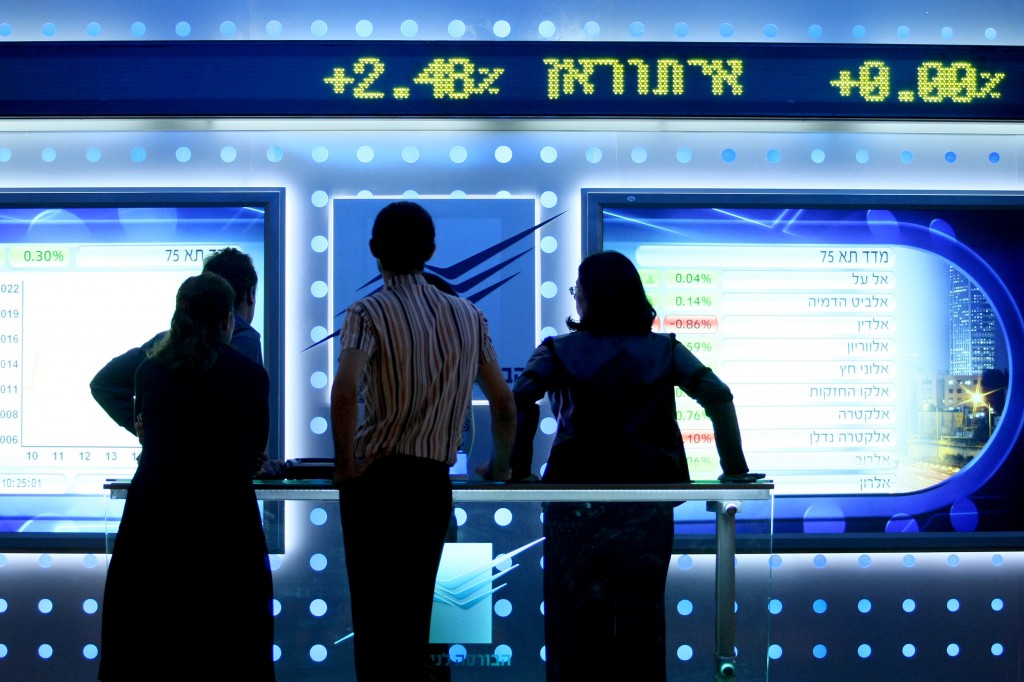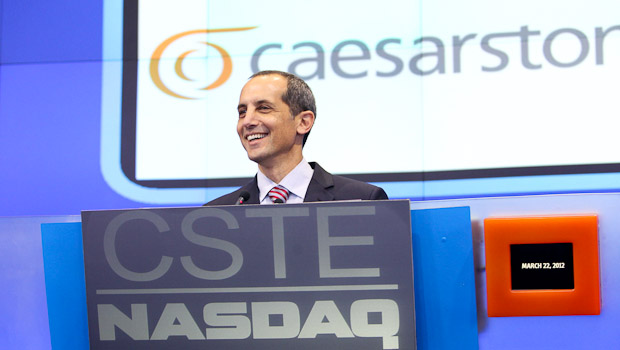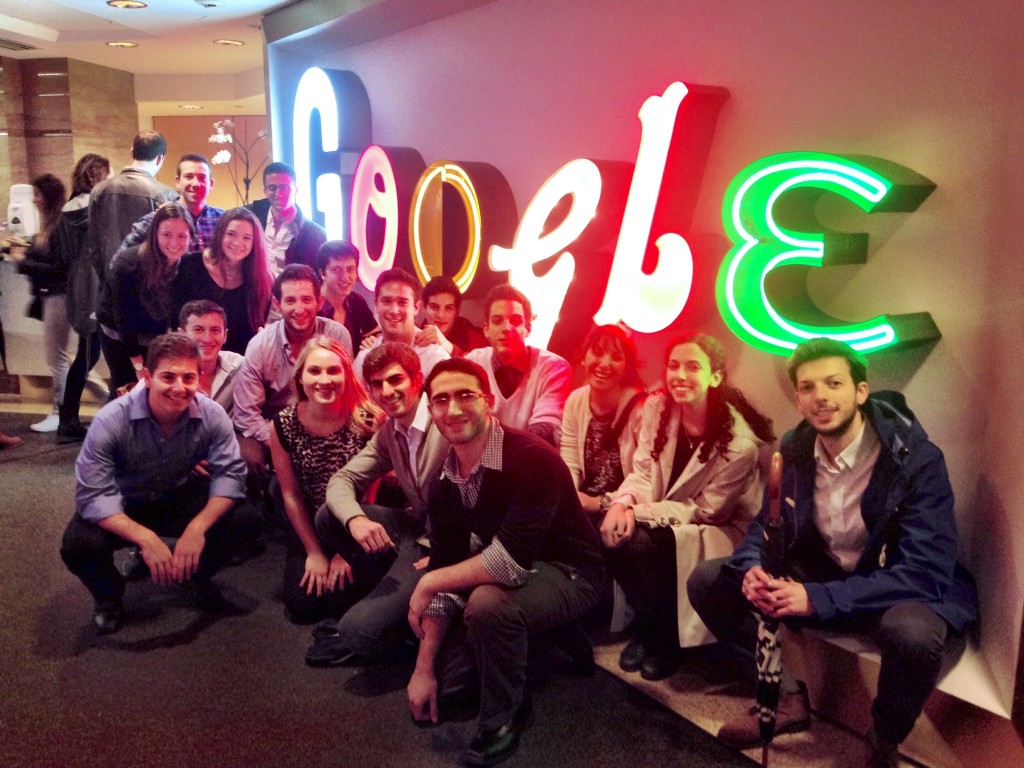Meet the man who will change the way the world invests in Israel.
On the wall of Steven Schoenfeld’s office in midtown Manhattan, pride of place is given over to a poster of early 1960s vintage, advertising TWA flights to Israel. With its rich colors and childlike draftsmanship, its display here, in the space of a decidedly contemporary investment house focused upon the intricacies of capital markets, will warm the hearts of any nostalgists passing through. The poster conjures up memories of a more innocent, more optimistic time, when we knew what TWA stood for, but we’d never heard of BDS. A time when Israel was regarded as a destination for progressive young pioneers, rather than vilified as an occupier.
That, however, is the past. The current political realities that anyone dealing with Israel—whether in government, in academia, in the media, or, in Schoenfeld’s case, in capital markets—must grapple with are not nearly as benign. But here’s the rub: for all the panicked talk of boycotts and divestment, in economic terms, Israel’s global status is at its most assured level yet.
Schoenfeld is the Chief Investment Officer of BlueStar Global Investors, a firm he launched in 2010 with the explicit purpose of driving investors towards Israeli capital markets. During the week that I met with him, the economic news coming out of Israel was positively glowing. Viber, an internet messaging platform started in 2010 by four Israeli entrepreneurs, had just been purchased by Rakuten, the Japanese internet giant, for $900 million. Additionally, Google acquired SlickLogin, another Israeli start-up that soothes password nightmares by using a low-frequency sound generated by an app to log into web sites, for an undisclosed amount (industry analysts reporting on the deal noted that similar purchases made by Google in the recent past were valued at over $1 billion.)

Steven Schoenfeld, Chief Investment Officer of BlueStar Global Investors. Photo: John Lothian News / YouTube
Neither were the successes confined to Israel’s effervescent tech sector that is dubbed, perhaps a little too cutely, “Silicon Wadi.” Caesarstone, a company born in Kibbutz Sdot Yam that produces quartz countertops and other interior surfaces, announced a massive fourth quarter revenue increase of 27 percent, to $96.8 million. Yosef Shiran, who became the company’s CEO in 2009, believes that these recent leaps in the market only the scratch of the surface of the total opportunity. Quartz is “one of the strongest minerals after diamonds on earth,” Shiran explained, and that, along with its low cost and low maintenance, makes it ideal material for surfaces. 80 percent of Israeli homes contain quartz surfaces, whereas in the U.S.—now Caesarstone’s biggest market—quartz penetration is still only ten percent, but rising steadily. “There is still a lot of room for growth in countries that have not embraced quartz in the way it’s been embraced in other markets,” Shiran told me.
By nature an animated man, the bullishness Schoenfeld displayed during our interview reflected his assertion that the performance of Israeli companies like these should magnetically attract investors searching for a secure bottom line. As a result of that deeply-held conviction, Schoenfeld and his colleagues at BlueStar have developed a complex methodology to steer investors into an economy that, back in the 1980s, was scarred by hyperinflation, but which subsequently emerged to rebuff the 2008 global economic crisis with more aplomb than Europe and even the United States.
The growing awareness of Israel’s economic dynamism, bolstered by the 2009 bestseller Start-Up Nation by Dan Senor and Saul Singer, a book that briskly extolled the virtues of Israel’s corporate culture, has certainly eased BlueStar’s path into the investor community. Still, Schoenfeld points out, the indicators are not yet blindingly obvious to everyone. The perception of Israel as a country mired in regional conflicts is one brake on investor enthusiasm. The habit of regarding Israel as a recipient of diaspora Jewish munificence, by slipping a few coins into a Jewish National Fund blue box or by purchasing Israel Bonds, is another.
“You should absolutely give as much charity as you can,” Schoenfeld told me emphatically. “In no way am I saying the mission of BlueStar Investments is to replace charity.” What the company offers, he continued, can be described as “Mission Driven Investing,” a concept that rests upon three pillars. Firstly, that Israel is a sound investment in purely fiscal terms. Secondly, that investing in Israel conforms to the mission of large institutions with substantial endowments, like the various Jewish Federations around the United States. Thirdly, that by investing in Israel, the country’s economic profile is boosted at a time when its graduation from emerging to developed market has created a fresh set of challenges—as Schoenfeld describes it with an endearingly eccentric metaphor, Israel has gone from being a “large carp in the Mediterranean” to a “small minnow in the Atlantic.”
While the second and third pillars are oriented towards Jewish individuals and institutions, the first is intended to exercise universal appeal. “You’re probably too young to remember the Levy’s Jewish Rye ads,” Schoenfeld told me (I’m not, incidentally), referring to the iconic marketing campaign of the 1970s that showed an Irish-American cop and a Native American happily munching on a piece of rye bread with the legend “You don’t have to be Jewish to enjoy…” in the background. So it is when it comes to investing in Israel.
In making the investment case, Schoenfeld reeled off a list of solid macroeconomic factors that make Israel “an overlooked gem.” The government, he said, has efficiently managed the country’s budget, in large part because of what Schoenfeld praised as the “magnificent” performance of the recently-departed Bank of Israel Governor, Stanley Fischer, in directing monetary policy. Indeed, selecting Fischer to run the bank will likely be remembered as Benjamin Netanyahu’s canniest decision during his spell as Finance Minister in the government of the late Ariel Sharon. During the Fischer years, Israel withstood the 2008-09 economic crisis better than any other Western country. Israel’s economy shrank only during the second quarter of 2009, by—as The Washington Post put it—a “puny” annual rate of 0.2 percent. During that same period, the U.S. economy shrank by an annual rate of 4.6 percent, while other global powerhouses like Germany and the United Kingdom fared even worse. “While they were languishing, by September 2009 Fischer was raising interest rates, all but declaring the recession defeated,” observed the Post.
Israel’s relative lack of exposure to the banking crisis that fueled the 2008 recession helped to ensure that its credit rating remained healthy. Moody’s rating for Israel at the close of 2013 was A1, while Standard and Poor’s rated the country at A+, citing the diversification of Israel’s economy and the positive impact of natural gas production—worth, according to a January 2014 Ernst and Young assessment, $52 billion to the Israeli economy—as key considerations.
For a country that was dragged into military conflicts in Lebanon in 2006 and in Gaza in 2008 and 2012, such a record is self-evidently impressive. Yet a February BlueStar research report on geopolitical risk factors argued counter-intuitively that the Israeli equities market “has been more closely tied to major global trends and economic shocks” than to the turbulent events in the Middle East.
As the report demonstrates, from 1997 until 2013—an era that witnessed the breakdown of the Oslo peace process, the eruption of the second Palestinian intifada, the 9/11 atrocities, the wars in Afghanistan and Iraq, and unprecedented regional upheaval from Tunisia to Iran—Israeli equities increased in value by a whopping 324 percent. A critical factor behind that surge was, contrary to received wisdoms about the relationship between war and economics, Israel’s constant battle-readiness, which has resulted in the country becoming one of the top five global military exporters, engaging in some $7 billion worth of international business annually. “It is the spin-off of technologies originally developed by and for the Israeli military that has powered Israel’s rise into a global hotbed of technology development and the commercial application of once top-secret technologies,” the BlueStar report explained. “They go a long way to explaining why Israel has the most NASDAQ-listed companies of any foreign country except China, and virtually every major global technology company—from Intel to Google, from Samsung Electronics to Microsoft—has a research and/or production presence in Israel.”

People watch a board showing stock fluctuations at the Tel Aviv stock exchange. Photo: Moshe Shai / Flash90
This last point was also underlined to me by Maya Hagoel, who works in investor relations for Wix, an Israeli web design platform that went public on the NASDAQ last November in the largest-ever IPO for an Israeli firm, which resulted in the company being valued at $750 million. (The company’s platform has turned out to be so popular that the radical organization Code Pink, which enthusiastically supports the BDS campaign, was the source of much mirth when it was discovered that its website for an International Women’s Day Delegation to Gaza was built using Wix’s freeware.) “We live in a problem-solving culture,” Hagoel told me. “Many of us go to the army at a young age, and are dealing with problem-solving from an early point in our careers. And because we’re a small country, there’s a real camaraderie between the startups that encourages knowledge sharing.”
Caesarstone’s Yosef Shiran, meanwhile, has what he called a “Darwinistic” take on Israel’s business culture. “Israel itself is a small market and the neighborhood is not so friendly,” Shiran said. “So if you want to be a successful company in Israel, you have to do business all over the world, and you have to learn to withstand all the different economic trends, all the storms.” He also highlighted the role of Israel’s academic institutions in motoring product development. When, in 1987, Caesarstone’s developers began experimenting with quartz as a material for large tiles, Shiran related, they did so in collaboration with Haifa’s Technion, where the chemical agent that binds quartz tiles together was first created.
For those investors seduced by Israel’s investment climate, the question of how to implant their money there remains. “I can walk into a hundred board meetings and say, ‘Israel’s great, here are the returns,’” said Schoenfeld. “That won’t get them to a decision. They have to figure out how it fits into their portfolio.”
And that is where the BlueStar Israel Global Index comes in.
From its inception, Schoenfeld asserted, Israel’s economy was already global in nature; given the country’s domestic market of just under 8 million souls, for ambitious Israeli companies it could not have been otherwise. Yet Israel’s profile in the large global investor indexes, like the FTSE and MSCI, was always dramatically underweighted. “Just like the local Israeli index, these big indexes only include Israeli stocks listed on the Tel Aviv stock exchange, which sounds pretty logical to someone who doesn’t understand the Israeli capital markets,” Schoenfeld said. “Many Israeli companies are dual listed or have the primary listing outside Israel, and there’s a very good reason for that. A good number of these leading companies are in technology. They start in Israel, but as soon as they can, they open a marketing office in Silicon Valley, or on Route 128 in Boston, or in New York. They can’t just look at the Israeli market.”
A self-confessed “quantitative nerd” who previously worked as an indexing expert for gargantuan investment firms like BlackRock and Northern Trust, Schoenfeld set about developing a methodology to both maximize returns in the Israeli market and show the country’s true worth. From the outset, that meant broadening the definition of Israeli companies beyond the restriction of a Tel Aviv listing. In determining whether a company is Israeli, and therefore valid for inclusion in the BlueStar Israel Global Index (BIGI), a number of quantitative and qualitative criteria have to be met. These include whether a company is headquartered in Israel, whether its tax status is in Israel, and whether the company has major Research and Development or logistical facilities located in Israel. Take Wix as an example: while the bulk of its market is in the U.S., the majority of its staff working in R&D are domiciled in Israel.
By including Israeli companies listed on foreign exchanges in the BlueStar index, “it almost doubles Israel’s size in stock market terms,” said Schoenfeld. No less important is the diversification of Israel’s market. While Israel is known for its technological innovations, technology companies compose 31 percent of the BIGI, with strong representation of other sectors such as health care (28 percent,) financial services (19 percent) and energy (six percent.)

An Israeli worker keeps watch on a production line at the Teva Pharmaceutical factory in Jerusalem. Teva Pharmaceutical Industries Ltd. is the largest generic pharmaceutical companies in the world, and is the largest constituent of the BIGI. Photo: Olivier Fitoussi / Flash90
The BlueStar index is tracked by the Israel Exchange Traded Fund, which was listed on the New York Stock Exchange with the ticker “ISRA” in June 2013, and is a vehicle for investors to gain exposure to this broad cross-section of Israeli companies. In the intervening months, six Jewish Federations and three other Jewish organizations have invested in the fund, in a practical demonstration of the Mission Driven Investing evangelized by Schoenfeld.
Schoenfeld’s immediate priority is to increase the participation of other Jewish institutions. “There is more than $50 billion in organized Jewish communal assets of which almost none is invested in Israel,” he told me, brandishing a copy of the Israeli business daily Globes from last June, which carried a headline bemoaning the fact that American Jews were directing their funds towards Turkey and the Arab Gulf, but not Israel. “Many of these institutions look inside their portfolio, and they realize they have 2 or 3 percent in all these countries that don’t like Israel, and that they have virtually nothing in Israel,” Schoenfeld said. “So if you’re investing all over the world, why not consider over-weighting Israel, giving a little more to Israel than you do to Malaysia or Indonesia or Turkey?”
This is, perhaps, a rare example of a politically-motivated investment decision that also, when one remembers the consistently robust performance of Israeli equities, makes good economic sense. According to Schoenfeld, there are several benefits that flow as a consequence. Among the more important is that it introduces a side of the Jewish state to young American Jews left unmoved by the blue box commitments of their parents and grandparents.
In that regard, Schoenfeld spoke warmly of TAMID, a campus organization started by two University of Michigan students in 2008 that has rapidly expanded into other universities, including Harvard, Brandeis, Cornell and Lehigh. The impetus behind TAMID, its Executive Director Brett Goldman told me, emerged from a survey of Israel-related activities on American campuses. “Everything was very politically or socially-oriented, but not business focused,” said Goldman. “We wanted an opportunity that would help us develop professionally as well as connect with Israel.” As well as engaging in simulated investment exercises guided by the BIGI, TAMID participants also work on consulting projects with Israeli start-ups. TAMID’s intent is that, through these and similar activities, the next generation of American Jewish leaders will view Israel as a business partner and an investment destination, rather than as a purely philanthropic cause.
For Israel advocates feeling harried by the BDS campaign, these developments should be regarded as reason for cheer. To begin with, the buoyant economic data being gathered from Israel punctures the contention that the boycott campaign has the potential to be economically effective—a myth stoked by, among others, Secretary of State John Kerry, who has regularly warned of Israel facing “boycotts on steroids” should the peace process with the Palestinians falter. As Schoenfeld pointed out to me, “professional investors don’t view Israel’s economy through the lens of BDS.” Despite the best efforts of the BDS campaign to brand Israel as the 21st century incarnation of apartheid South Africa, Schoenfeld is convinced that the comparison does not hold water in the board rooms of U.S. investment funds, whereas “the movement against apartheid in South Africa did gain traction with U.S. investors, because there was a very strong consensus politically and institutionally that South Africa was doing something wrong.”
What, though, of the large European pension funds that have either considered divestment from Israel, or have actually done so, like the huge Dutch fund PGGM? Schoenfeld conceded that this is a “worrisome trend,” but the anxiety is political, not financial. “The best way to counter divestment is investment,” Schoenfeld said. “If PGGM, which is an $80 billion pension fund, divests a few billion, we should invest twice as much. Let’s take the Jewish community in the United States. Not only is there $50 billion in these endowments, there is also family foundation and individual wealth that probably drives that number up to $150 billion. Investing even one percent of that—$1.5 billion—will help counteract any practical effect of divestment.”
The more appropriate question we should be asking ourselves is not whether Israel will be irredeemably damaged by a marginal anti-Semitic campaign, but what the next stage of growth for the Israeli economy will involve. For all its advances, Israel does not yet have a Google, an Apple or a Samsung, partly because its successful companies frequently end up being sold to foreign entities for substantial profits. Yet the current crop of Israeli market leaders—from Caesarstone to Wix to the soft drinks company SodaStream to the plastic armor manufacturer Plason, whose equipment has been utilized by the U.S. military in Iraq and Afghanistan—remain firmly Israeli and are therefore contenders. Which will it be? As Steven Schoenfeld would likely advise, study the data and take your pick.
![]()
Banner Photo: L.D. Heuser / Wikimedia







